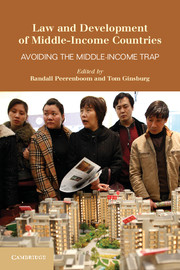Book contents
- Frontmatter
- Contents
- List of Contributors
- Acknowledgments
- 1 Law and Development in Middle-Income Countries
- Part I The Politics of Development in Middle-Income Countries
- Part II Middle-Income Countries in a Globalized Economy
- Part III Good Governance and the Rule of Law in Middle-Income Countries
- 7 Law and Development in Central and Eastern Europe
- 8 Judicial Intervention in Civic-Military Relations
- 9 The Prospects for Anticorruption Law in Middle-Income Countries
- 10 The Delivery of Justice in Middle-Income Countries
- Part IV Socioeconomic Challenges in Middle-Income Countries
- Part V International Donor Strategies for Middle-Income Countries
- Appendix Selected Country Data as of 2011
- Index
- References
9 - The Prospects for Anticorruption Law in Middle-Income Countries
Published online by Cambridge University Press: 05 June 2014
- Frontmatter
- Contents
- List of Contributors
- Acknowledgments
- 1 Law and Development in Middle-Income Countries
- Part I The Politics of Development in Middle-Income Countries
- Part II Middle-Income Countries in a Globalized Economy
- Part III Good Governance and the Rule of Law in Middle-Income Countries
- 7 Law and Development in Central and Eastern Europe
- 8 Judicial Intervention in Civic-Military Relations
- 9 The Prospects for Anticorruption Law in Middle-Income Countries
- 10 The Delivery of Justice in Middle-Income Countries
- Part IV Socioeconomic Challenges in Middle-Income Countries
- Part V International Donor Strategies for Middle-Income Countries
- Appendix Selected Country Data as of 2011
- Index
- References
Summary
INTRODUCTION
All countries struggle to prevent public power from being used for private gain. Middle-income countries (MICs) are certainly no exceptions. Corruption is widely viewed as a substantial impediment to development in these countries, and ever-increasing amounts of attention are being paid to methods of controlling corruption.
Contemporary anticorruption programs have a strong legal flavor. Tremendous amounts of effort have been invested in creating international legal instruments that bind states and international organizations to take various steps to combat corruption. In many cases those steps require further legal action, such as the creation of new organizations; changes in the structure of existing organizations; enactment and enforcement of prohibitions and disclosure requirements; or changes in the terms of contracts.
These initiatives reflect remarkable optimism about the potential of law to effect positive social change. They presume that legal institutions can be used instrumentally to combat corrupt practices. Some of these initiatives also embody faith in the power of legal institutions that operate across national boundaries. The most innovative new approaches go beyond treaties and international organizations and try to recruit foreign courts, prosecutors, regulators, and plaintiffs into the project of combating local corruption, hopefully in a way that complements local efforts. It might be unreasonable to place this kind of faith in the legal institutions of low- income countries (LICs), where state capacity is sharply limited by resource con- straints. But in MICs the state is not bound by these kinds of constraints and so should, in principle, be capable of creating effective anticorruption institutions.
- Type
- Chapter
- Information
- Law and Development of Middle-Income CountriesAvoiding the Middle-Income Trap, pp. 179 - 194Publisher: Cambridge University PressPrint publication year: 2014



